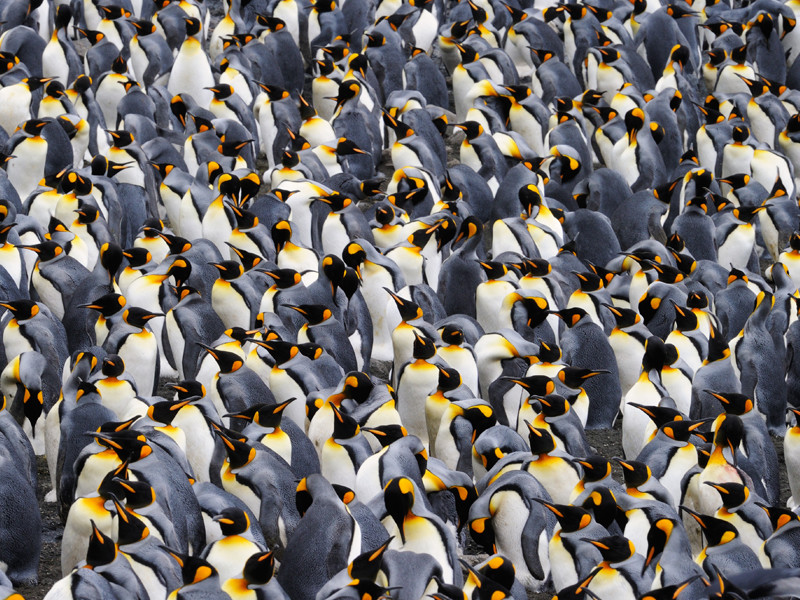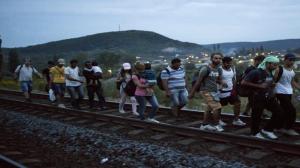By any historical measure the British citizen has never been safer, more prosperous, and capable of fulfilling their potential. Yet the polls predict that roughly half of voters are prepared to leap into the unknown tomorrow. This mirrors the mentality of tens-of-millions of Americans who are ready to walk a path led by Trump or Sanders. Why is this?
Part of it is the harsh cruel reality of modern quarterly report drive capitalism. If you make refrigerators in Indiana you might get fired so a worker in Mexico can do your job for a fraction of the cost thus adding 0.0034% to your company’s next earnings report. Same goes for your average British steelworker who has to lose his life’s work because China’s wise state planners couldn’t do simple math to determine basic supply and demand.
Unfortunate as these kinds of devastating situations are, they are not the majority of voters. They do not explain the society wide shifts in tone or direction. To get the total answer you need to go deeper and consider identity and vision.
Vision
Vision is where you see yourself, your family, and your country going. It’s the broader ideals and goals that propel a people. These things matter even if you’re just shilling cosmetics or sitting in a cubicle every day. It’s a natural human need to be a part of a greater whole. But a coherent society requires competent and inspirational leadership. And if the modern world is lacking in anything, it’s high caliber leadership. Of the G7 group of leading democracies, every single one is currently led by a career politician. None of them have really lived an average normal life outside the world of politics. It shows. It reflects the modern incarnations of machine politics where most major lever pullers in the executive and legislative bodies are rich, connected, and have more in common with each other than the average voter, regardless of political party.
People tend to notice when a leader cannot intellectually relate to them. They pick up on this rather quickly, whether it’s on the factory floor or the presidential podium. Cameron is a cartoon caricature of an elite aloof toff. Clinton has openly admitted she hasn’t driven a car in like two decades. None of these people have ever had real jobs. They’ve never been fired. They’ve never had to struggle with where their next meal was coming from. They’ve mostly never encountered real adversity beyond the typical mudslinging encounters of the political parlor room.
From adversity and failure a human can find themselves utterly crushed. Or, a person can use those dark times to build their character and strength. Using these fortified qualities a leader can thus better relate to the citizen whose pain at one point they might have experienced. And certainly, having undergone their own versions of hell, a leader built from adversity is better able to manage the crises of the day.
When a leader can’t relate to the voter, or when a leader appears incapable or powerless in confronting the evils of the day, then there is virtually no chance that a vision for the future can be imparted upon the minds of society as a whole. And without that, it’s thus left to any number of nutcases to fill the void.
Corbyn, Trump, Sanders, Farage, Le Pen, all these folks have some fairly decent ideas for the future, at least worth discussing. Mostly though, they seem to have a whole bunch of really terrible ideas. But they make up for their insanity by their ability to impart a vision for the future on anybody willing to listen. And people feed off of that because the traditional leaders of the day are otherwise unable or unwilling to provide any compelling vision at all.
Identity
As a subset of vision, identity is what a person feels they are a part of. In the simplest terms of Brexit, it’s does a voter feel that are British, or English, or European, or whatever. Increasingly throughout modern democracies the identity of a person is becoming more local. Scots see themselves as Scottish, Catalonians over Spanish, Texans over Americans, and so on. This is partially tied to the lack of decent leadership already discussed. When remote, aloof, national leadership seems unable to solve the problems of the day, folks are inherently going to look for answers with their local leaders. In part this isn’t necessarily a bad thing considering your local mayor has far, far more impact upon your life then the president does anyways. Are bigger problems created however, if we keep driving ourselves to the local level?
Also a factor is the almost total loss of a driving national identity in most Western democracies. Before 1945 the British identity was the Empire. Between 1945 and 1991 it was defense of liberal democracy against communism. What’s Britain’s national identity about today? Judging by the major campaign issues of the last general election, it’s NHS fees, bus fares, and tweaking the edges of welfare eligibility payments. These are not the topics that inspire a Scot to remain a fervent Brit.
The same pattern is beginning to take hold in an America that is increasingly unhappy trying to play the thankless dangerous role of world cop. After 15 years of quasi-war it’s still quite possible for the same enemies of September 11th to slay Americans and Afghans at will. If you lost your job to Mexico, or will spend 20 years paying off student loan debt, or pay every check into a Social Security account you know you’ll never see, then it becomes a bit harder to step back and give a pleasing sigh during the Star Spangled Banner. And if all of this be the case, why should you care about the American dream or what happens in Syria?
A more common response to all of this is to turn inward, to seek the answers in a far more local setting, with the people and values closest to you. With the historical roots that are essentially unshakeable no matter how you slice geography or political structure. Maybe there’s just something to be viscerally said for keeping a people together if you share the same time zone, weather, football team, and drinking water supply.
Brexit
The appeal of Brexit is the clear benefits of identity and vision. The identity is pure Britannia. The vision is a United Kingdom unshackled from an incompetent, distant leadership incapable of battling the problems of the day. It’s certainly an appealing vision. But the question at hand is can such a vision and identity actually deliver? I’m not so sure.
Leave aside the possibility if you can, that the Scots might want out of a UK not in the EU, or that the Northern Irish are going to struggle to come to grips with a full EU border to the south. Even if the UK can hold together post-Brexit, what would this new Britannia actually be? What is the UK without an Empire, without a direct tie to Europe, or without the ever-present struggle for freedom?
Without any of these things, I suspect the answer is that Great Britain (and certainly England alone) is a fourth rate nation struggling on the fringes. Britannia, whatever that is today, requires Europe. It isn’t going to magically reappear outside the handcuffs of the EU. Localism isn’t going to somehow deliver the British economy from Brussels. The British economy requires Europe to survive, and that’s a tall order for an angry EU to fulfill post-Brexit.
To which the Leave campaign’s answer seems to be the creation of a new Britannic vision, a new British Singapore, a new island nation trading post free from that old sick man of Europe. I suppose this is possible, I just don’t see how it happens unless the answer lies in totally going all in with the already active policy of sucking up to China to become their Singapore of Europe. Cameron is of course knee deep in courting China, but post-Brexit this effort would have to go into overdrive. And is this new Britannia prepared to sell its soul on human rights, democracy, and freedom in order to economically survive? I’m not sure it’d have a choice.
Take away Brussels tomorrow and the UK doesn’t automatically become a free little bird in an open sky. The dirty little secret of modern Britain is that the dark master of bureaucracy does not reside in Brussels, he resides in London. In the UK, tasks, regulation, and enforcement of major local issues that in America would be handled by local city councils and mayors, are in Britain handled by bureaucrats in London. One of the more beneficial and inspirational efforts of Cameron’s tenure has been to try and remedy this by pushing more power back to the local level, but they are a long, long way from anything approaching what most Americans would consider reasonable local government. In or out of the EU, this problem doesn’t get solved overnight.
Localism
I don’t have a cure for any of this. It’s a creepy scary dark time in our course of history and I fear nobody has any real answers. And that there aren’t any real leaders out there prepared to tackle the major issues of the day. But I’m not sure Trump or Brexit or whatever are the answers either. I just don’t think they provide the solutions that people seek.
The problem with this new localism is it tends to overlook the reality that everything we do in our modern societies depends not on the local but on the global. Whether it’s containerized shipping, call centers, cheap diapers at Walmart, or the nice reality that World War III is not coming tomorrow, our world as it stands today is defined not by Brits being Brits but by the ever increasing connections happening between people worldwide.
It’s a rather jarring situation that nobody’s really ready to handle. It’s uncomfortable for people to wrap their minds around the construct that what could happen to their pocketbook or their way of life is not really guided by them, but also perhaps not their own leadership either. A president Trump would have to wake up real quick once he realized how much of the American economy is wrapped up in China. A post-Brexit led Johnson would have a real hard time solving the economy when so much of Britain’s trade is wrapped up in the ability for Europe simply to say no to him.
Whether we like it or not, we have built a world where our vision and identity are not local but global. We can still be British or American or whatever we prefer, but what we cannot do is pull backward in time. We may not be ready for a true global identity, perhaps not ever, but the allure to reestablish our identity and vision to the local level isn’t the answer. We’re simply too connected for that.
Prediction
Tomorrow’s vote is likely to run very close but I’ll throw my guess that Remain just edges out Leave. When the undecided voter gets into the booth tomorrow, they’ll still have that ever common human trait that fears the unknown. Lots of folks are tempted to dive into the uncertainty but I suspect the small percentage that will turn the vote one way or the other is going to push for stability, for the certainty of the same. So Remain wins, but by just a hair. Then we’re left with the broader issues outlined above. It’ll be quite the long road to solve them.











